
The Grand Canal is the largest channel in Venice, Italy, forming one of the major water-traffic corridors in the city.
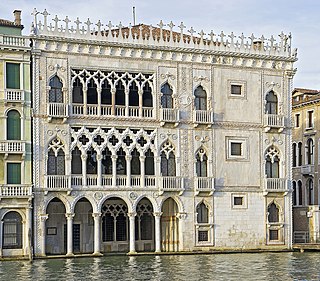
The Ca' d'Oro or Palazzo Santa Sofia is a palace on the Grand Canal in Venice, northern Italy. One of the older palaces in the city, its name means "golden house" due to the gilt and polychrome external decorations which once adorned its walls. Since 1927, it has been used as a museum, as the Galleria Giorgio Franchetti.

Ca' Rezzonico is a palazzo and art museum on the Grand Canal in the Dorsoduro sestiere of Venice, Italy. It is a particularly notable example of the 18th century Venetian baroque and rococo architecture and interior decoration, and displays paintings by the leading Venetian painters of the period, including Francesco Guardi and Giambattista Tiepolo. It is a public museum dedicated to 18th-century Venice and one of the 11 venues managed by the Fondazione Musei Civici di Venezia.
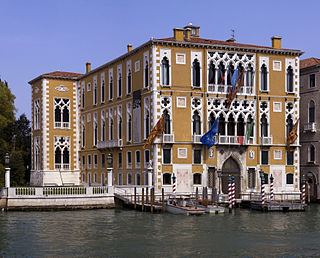
Palazzo Cavalli-Franchetti is a palace in Venice, Italy, not far from the Ponte dell'Accademia and next to the Palazzo Barbaro on the Grand Canal of Venice. The palace was erected in 1565 by the patrician Marcello family, later passing to the Gussoni. In the 19th century it was internally modernised and externally enriched in revived Venetian Gothic style, with rich window framing, by a series of grand owners.
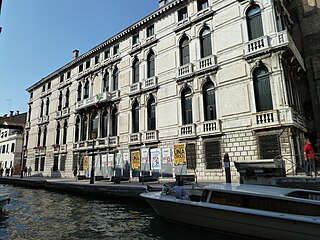
The Palazzo da Lezze or Ca' Lezze is a Baroque palace in Sestiere of Cannaregio in the city of Venice, Italy. It is located on Rio della Misericordia, with a facade on the fondamenta (canal-sidewalk), and stands between the Scuola Grande Nuova della Misericordia and Calle Largo Lezze.

Palazzo Nani is a Renaissance palace in the Cannaregio district of Venice, Italy.
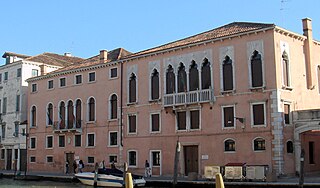
Palazzo Testa is a small Gothic palace in Venice, Italy, located in the Cannaregio district and overlooking the Canale di Cannaregio.

Palazzo Civran Grimani is a Neoclassical palace in Venice, Italy. The palazzo is located in the San Polo district, overlooking the Grand Canal at the confluence with Rio della Frescada, between Palazzo Dandolo Paolucci and Palazzo Caotorta-Angaran.

Palazzo Giustinian Pesaro is a Gothic palace located in Venice, Italy, in the Cannaregio district and overlooking the Grand Canal. The palazzo is situated between Ca' d'Oro and Palazzo Morosini Sagredo.

Palazzo D'Anna Viaro Martinengo Volpi di Misurata, also known as Palazzo Talenti D'Anna Volpi, is a Renaissance palace in Venice, Italy, located in the San Marco district, overlooking the left side of the Grand Canal, between Palazzo Tron and Casa Marinoni and opposite of Palazzo Donà a Sant'Aponal.

Palazzo Donà Balbi is a palace in Venice, Italy, located in the Santa Croce district, overlooking the right side of the Grand Canal on the Riva di Biasio foundation opposite Palazzo Flangini and the church of San Geremia.
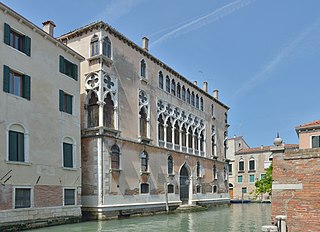
Palazzo Donà Giovannelli is a civil building located in the city of Venice, Italy in the Cannaregio district. The palace neighbors Palazzo Pasqualigo Giovannelli and overlooks the Rio di Noale and the Rio di Santa Fosca.

Palazzo Falier is a civil building located in Venice, Italy in the Cannaregio district. The palazzo is particularly known for having been the home of Marin Falier, Doge of the Republic of Venice, who was executed for attempting a coup d'état.
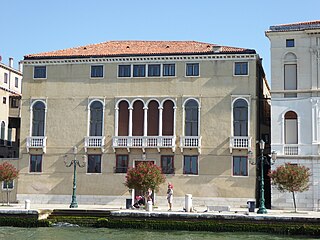
Palazzo Giustinian Recanati is a palace in Venice, Italy, located in the Dorsoduro district and overlooking the Giudecca Canal, just to the left of Palazzo Clary.

Antonio Diedo was an Italian architect. Born in Venice, he was active both in his natal city and the mainland towns of the Republic of Venice.

Palazzo Michiel del Brusà is a palace located in Venice, more precisely in the Cannaregio district, and overlooking the Grand Canal. The building is located between Palazzo Michiel dalle Colonne and Palazzo Smith Mangilli Valmarana.
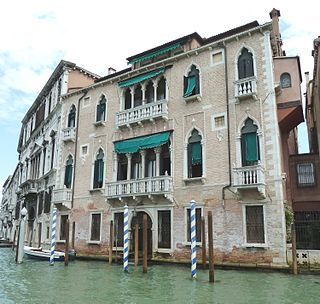
Palazzo Erizzo Nani Mocenigo is a palace in Venice located in the San Marco district and overlooking the Grand Canal between Palazzo Da Lezze and Palazzo Contarini delle Figure.
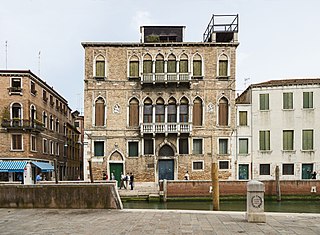
Palazzo Barbarigo Nani Mocenigo is a Gothic palace in Venice, Italy located in the Dorsoduro district, along the Nani embankment on the San Trovaso canal, near the Campo San Trovaso.

Giovanni Battista (Giambattista) Meduna, knight and Commander of the Order of Saints Maurice and Lazarus, was an Italian architect from Venice.




















